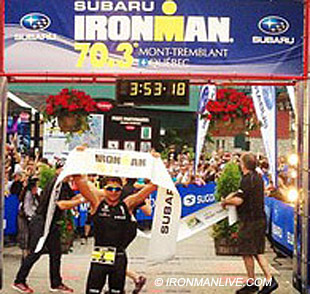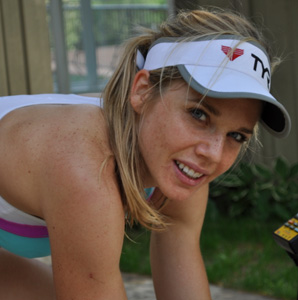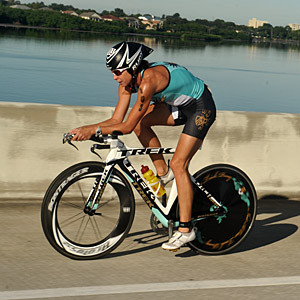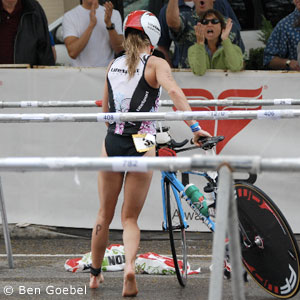Magali accentuates the positive
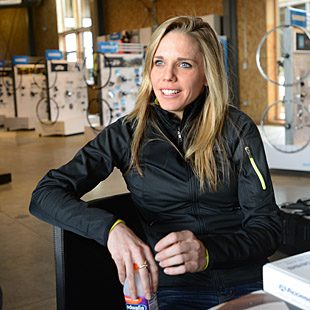
Magali Tisseyre was not a triathlon prodigy by any measure. While other pros started before they were teens in IronKids, this adventurous Quebec lass filled her early teen years as a serious classical violinist and actor while she embraced several sports including cross country running, downhill and boardercross skiing, swimming, mountain biking and road cycling. Not until she was 22 did she do her first triathlon and at 23 did she win the Canadian University Championship and decide that swim-bike-run would be her chosen instrument of athletic expression.
After a few years of amateur success, including the 2005 ITU World Duathlon Championship 20-24 age group title, Tisseyre reached the age of 27 before deciding to turn pro. After she signed on with top Canadian coach Lance Watson early in 2009, Tisseyre quickly rocketed to the top and by the end of the year made the podium at the Ironman 70.3 World Championship in Florida.
While amassing 11 Ironman 70.3 wins, she spent two and a half years coached by Watson, switched gears to spend a year with famed coach Siri Lindley, and returned to Watson in 2012. During this time she earned the equivalent of advanced degrees in triathlon training and racing from two of the best coaches in the world. And, in particular, she honed her innate predilection for positive thinking.
This interview took place while Tisseyre was attending the recent Pearl Izumi-Shimano triathlon elite team camp in Louisville, Colorado.
ROOTS
Slowtwitch: I hear your mom has been your greatest supporter. What kind of sporting inclinations did she have?
Magali Tisseyre: My mom started downhill skiing when she was 16 years old, which is very old for a skier to start. She got very good very quickly and ramped up to one of the top in the province after two years. She was a little bit crazy, and was known for her free skiing. She took a lot of chances and ended up twisting her leg so badly her ski was facing the other way. It destroyed her knee, and that was the end of a very short lived dream.
ST: What influence did your mom have on your love of sport?
Magali: When I was three, my mom taught us to ski and I was trying to do exactly what she was doing. I wanted to do it perfectly. I have always liked the technical side of sports. I wanted to be good at skiing and every single sport I tried.
ST: How did your mom inspire you?
Magali: My mom Christiane was an athlete and that is why I looked up to women athletes. It was funny. When I was little she wore a track outfit and shoes. For different reasons, I always thought she was a track star. She was into every sport and had this aerobics routine she would do while we played, the Jane Fonda For Athletes Only. I remember her doing the routine several times a week wearing a workout suit that had a superman logo at the front. She was intense!!
ST: When you were growing up in Canada, were you teased?
Magali: This is another piece of the puzzle. Some kids at school made fun of me for being short. I seemed much younger then my age for the longest time and it was hard.
ST: Did they make fun of you for playing sports?
Magali: Some people. But at the same time, they had a school cross country event where everyone had to participate. And I won it that year.
ST: You beat all the boys?
Magali: I was second overall. There was this little blond kid who looked exactly like me and we were both fast and he beat me. The school then encouraged us to go to Montreal to race and then to the provincial race. And they made this trophy for me and this little boy. I never forgot that. All of a sudden I had people encouraging me at school. Confidence came from moments like that. But I never went into cross country those days because I was focused on the violin. But I always kept running in the back of my mind.
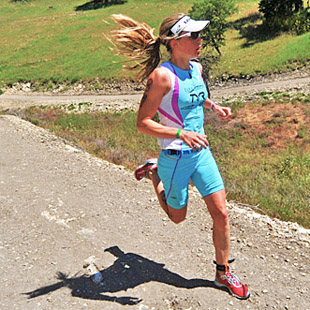
ST: You mentioned that a lot of key moments in your life occurred around Mt. Tremblant?
Magali: When I was growing up we lived near Mt Tremblant and I wanted to find out what kind of athlete I might be. In Tremblant there was a mountain bike race, a Canada Cup. I had never raced before on the mountain bike. I think I was 16 or so and my sister’s boyfriend said, ‘You gotta go and try that race in Tremblant.’ So I did and I was 9th in the Canada Cup in the junior category. It was good — I didn’t even know I could finish the race.
Later, I got a summer job in Mt. Tremblant and I bought a road bike to see what I could do. I biked 40 minutes from my place to work at Mt. Tremblant every day and I rode parts of what became the triathlon bike course. When I was riding on the mountain, I was thinking, ‘I wonder what I will do in my life?’ I could have been a musician because until I was 17, I spent four hours a day practicing the violin. I didn't know what I would become. But I knew it wasn't going to be school or an office job. It would be either the arts or sports.
ST: What was your favorite music to play?
Magali: Tchaikovsky was my favorite composer. It was my one great emotional thing.
ST: How did you settle on triathlon?
Magali: When I was 22 years old I was studying kinesiology and when I got on the university team that year I did my first race and I won it. Then I decided I want to be a triathlete. My mother understood how I felt and told me, ‘You can do it.’
ST: When did you get serious about triathlon?
Magali: I was 23. I had been waiting a long time to find my sport, the one where everything clicked, the one I loved and had the most talent for. So first thing, I wanted to find the best coach in Canada. I read Lisa Bentley was a great triathlete and Lance Watson was her coach. I went to one of his triathlon camps and he took me on as his athlete in 2009. Then everything happened very fast.
ST: I understand you went to Maui with Linsey Corbin early that year and got a taste for the amount of training required of a professional triathlete?
Magali: We trained crazy amounts. Linsey is so strong mentally and physically – she was great. That was the best mix of hell and heaven you could have in a month. But it is not painful to go to hell and back when you are training in Paradise.
STARTING WITH LANCE WATSON
When I got home from the camp in Maui, I had to go back to more time studying and there was not so much time for training. I graduated from McGill, with a degree in the biomechanics of running, before going to Lance. And because I rested, I came back strong for my first win in Boise 70.3! That was the first time I felt I could really make it as a pro. It was one of the best days of my life.
ST: What did Lance Watson do to turn you into a pro?
Magali: When I went to Lance the first time I was winning local races. Lance had me push my physiological limit to the maximum. All of a sudden I went to a different level. That first year with Lance, I was third in the world [at the 2009 Ironman 70.3 World Championship that November].
ST: What was the key to those workouts?
Magali: I worked a lot at threshold pace. Of course it was mixed with endurance and recovery. He knows how to balance it. And I went from 12 hours a week to 40.
In 2009, Tisseyre won Boise 70.3 and the Subaru half Ironman in Vancouver, was 2nd at Calgary 70.3, 3rd at Timberman 70.3, and 4th at Muskoka 70.3 and at Augusta 70.3 before making the podium at the Ironman 70.3 World Championship in Clearwater.
ST: That was a heady start. How long could you maintain it?
Magali: I got a lot better, but the time I spent with Lance I was listening to his voice but I wasn’t giving him my feedback. I would not try to say, ‘This is how I feel.’ I was his student, but we were not working together. It went great for 2 months, then I was completely tired. So I went back to school to finish my studies. And because I rested, I came back strong the next year.
In 2010, Tisseyre won 5 straight races – Mooseman 70.3, Buffalo Springs 70.3, the Vancouver half Ironman, Philippines 70.3 and the Banff Triathlon. She finished the year with a 2nd at Augusta 70.3 and another 3rd place at the Ironman 70.3 Worlds.
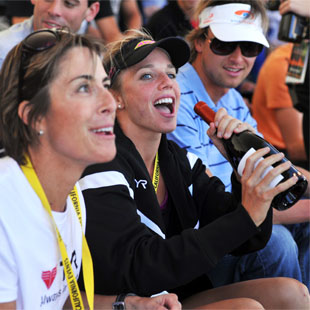
ST: How was Lance as person?
Magali: He was very driven, a very ambitious person. I had high ambitions too. I had big dreams and he helped me get there.
ST: Were you too insecure to speak up?
Magali: Yes. I think a lot of athletes do that with their coach. They don’t listen to themselves and say: ‘OK, I am tired.’ It is hard to say that to someone who wants to push you.
ST: You appreciated that push too?
Magali: I appreciated that because I was motivated to have someone setting a standard that allowed me to get to the next level. But once I got there, I realized I can't keep pushing like this or else I will disappear. I’ll be overtraining and will never be able to do this again.
ST: How long did you work with Lance before you came to that realization?
Magali: I think it was two years and a half. [2009 through early 2011] During this time I won two podiums at 70.3 Worlds [2009 and 2010]
ST: At the pro level, you have to learn how to make your career last?
Magali: At first it is easy to smash someone with hard training. Then the fine tuning must happen. The athlete had to give the feedback so the coach knows exactly who they are and where they are at. It was good at first. I know without Lance. I would never be on the map.
ST: At what point did you leave Lance that first time?
Magali: He thought I could keep on pushing at that level. And I wasn’t telling him I couldn’t. I kept it inside, and when it was too much it all came out at once. It is like a relationship. If you don’t communicate well, it all breaks down at one point.
WORKING WITH SIRI LINDLEY
ST: You switched to Siri Lindley in 2011 and worked with her for about a year. What did Siri do for you?
Magali: A different approach. She gave me a lot of volume and strength work. Things like climbing over-geared on hills and doing a lot of miles.
ST: Both Siri and Lance had different strong points?
Magali: With Siri I had a good relationship. Siri was great in her listening and for me, it was a new dynamic with a coach. For some reason, I didn’t feel the training worked for me a first as much as it had with some other athletes. It was a lot of volume and less intensity then I was used to. It was very different training and I realized later how much it helped me improve as an athlete.
During her work with Siri Lindley, Tisseyre finished 3rd at Wildflower, 3rd at Rev3 Knoxville, won Boise 70.3, Providence 70.3, Pocono 70.3, Rev 3 Anderson and placed 2nd at Miami 703.
ST: Siri studied psychology.
Magali: She understands that as long as you are positive everything will be OK. Soon as you start worrying, things bad things start to happen. In a race, you have to find an inner positive coach. When you are alone on the course, you can’t ask your coach or your mom. You have to ask that positive coach inside you. That is another thing that happened after Lance. I started developing my own personality in the sport. It is almost like leaving your parent and coming back with your own personality.
ST: Once you left Siri and went back to Lance in mid-2012, you had some great results. Why?
Magali: That is true. I owe Siri for that base training I needed to get stronger. As soon as I left Siri, I started easing off that volume and I won four races.
ST: Why did this happen?
Magali: Right after I went back to Lance, he had me doing some workouts I hadn’t done in a long time. I went and hammered some hills. And I did some more speed training. So after the increased volume with Siri, and the new workouts with Lance, I rested and it was a perfect storm.
In mid-2012 Tisseyre won 70.3s at Mooseman, Calgary and Mt. Tremblant, plus the Sooke International Triathlon, then placed 7th at Las Vegas 70.3 Worlds.
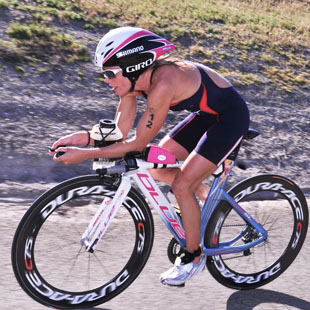
ST: Why did you get injured at the beginning of 2013?
Magali: It started because I had an instability in my ankle. There were little signs of it for a long time. But I never got injured enough to stop. Sadly, after that stretch of wins when I came back to Lance, I got injured — even though I did not train as long or as hard as before.
ST: How did your 2013 training start?
Magali: Before I started in 2013, I had a good off season. But maybe I took off too long and did not get enough exercise. When I started training again, we did not ramp up the volume too fast. Even so, that is when my ankle was pinching and then my SI [sacroiliac] joint completely went out. I fought with those injuries all year.
ST: I see you had a few good races between the injuries?
Magali: I was injured in my first weeks of training and it stayed with me all year. There were short bouts of remission and long passages of hard physical and mental challenges to overcome. For me, 2013 was an emotional rollercoaster ride but one that was necessary in my progression as an athlete.
ST: So how well did you communicate with Lance through those injuries?
Magali: I never told Lance about this sort of thing before. But this time, I had to tell him I was having these issues. I also wanted to know: ‘If I am not perfect or I am injured, are you still going to want to coach me? Are you still gonna believe I am gonna make it?’ We had some tough moments last year because I felt like I wasn't….
ST: You weren’t secure? You were still afraid to say, ‘I am hurt’?
Magali: It was that set of mind. It was almost [as if I was in the] military.
ST: What did you fear?
Magali: That I’ll lose my coach. It was that fear that he would find another good athlete. I think that is true with a lot of athletes…
ST: Did you explain that to him last year?
Magali: Yes. Totally. He is very understanding and I wondered why I hadn’t done it before. At that point, we started really working together. Even though sometimes when a problem presents itself, it is still tough. There were times when I said ‘Lance I'm running [well] again!’ And we’d both get excited. Then the next morning, I was hurting again and I said, ‘Lance I am sorry I can’t do this today. This is too much.’
ST: He knew you by then well enough to accept that?
Magali: I had to prove to him I was serious. The first time around, I felt he couldn’t trust me. So he learned to trust me, and I learned to trust him.
ST: You found a physio last year who helped with your injuries?
Magali: Yes. Sophie, my Montreal chiropractor, referred me to a person in Victoria, [B.C., where she trained with Lance Watson] Marie-Claude Bozek. They really helped progress the healing of the injury. Marie-Claude did a lot of motor pattern programming and realigning me. It all started because I had this big boardercross accident when I was 18. I ended up with a metal bar in my tibia.
ST: Does it bother you?
Magali: The bar is not the direct problem actually. It’s that my leg was never reeducated and my ankle had weaknesses because the bone had not aligned correctly afterward. Marie-Claude explained to me the joint close to the ankle was affected. For years it never gave me signs that anything was wrong. Then all of a sudden she had to realign all that.
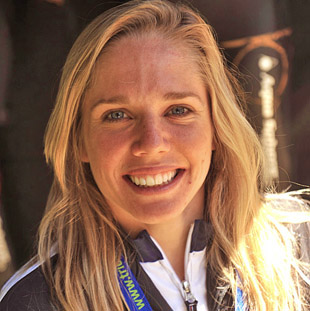
ST: What was your best race last year, given your injuries?
Magali: Because of my injury, I stayed fit with swimming and biking, but could not run much at all. At Muncie 70.3 [on July 12] I won that race and I had no idea where that came from. With the injuries I was coping with, it was crazy. Back in 2009, I won by 8:29 at Boise 70.3 for my first big win. That race was magical to me. And in 2013, Muncie was a mental breakthrough. I raced independent of the result , as I had no expectations, and the result came! For me it was a sign I do not have to always have perfect training in every discipline. I just have to be relaxed, fit and eager to race.
ST: You had to realize your fitness — and your vulnerability to your injuries — goes up and down.
Magali: I know that. But last year I took no shortcuts. I never took an anti-inflammatory last year. I never trained when I was hurting. I always had to wait and wait and wait. Then, ‘OK, I can race this one.’ If I felt healthy close to the race, I could still do well if I could pull in two strong training sessions before. So it was question of taking rests and waiting. And it really worked out well.
ST: What did Lance say about your self-realization?
Magali: We developed this frank way of talking to each other and he would be very understanding. I think he studied psychology and is really applying it to his coaching. I think that is good because he is listening. Communication is never perfect. But now at least there is a dialogue and we mostly end up agreeing in the end. Sometimes he wants me to be work hard and I want it too but there are times we have to wait.
ST: What was your biggest disagreement last year?
Magali: Three weeks before Las Vegas I was not feeling healthy and told Lance, ‘I’m not gonna race.’ Then we had this big discussion and he said: ‘You are registered. Go there and just see what happens.’ We ended up ramping up my training and I started being able to run. Then two weeks before the race, I said ‘OK. Let's just do it.’
ST: What did you think of your race?
Magali: I was 12th there with virtually no run training. That was good for where I was at the time. To be exact, I was able to run lightly again, three weeks before worlds – three times a week for about 30-40 minutes. Then I ended up doing two interval sessions in that last camp before worlds and I was betting that the residual general fitness from races during the season to make it through the run.
HER NEW MINDSET
ST: What are your goals this year?
Magali: My goal is to race healthy, and race better than ever because I feel blessed just to race whenever I can. I stopped thinking not to lose. I think to win. And that is a big shift for me. I think the hardest thing to do as an athlete is to stop thinking, ‘What if? What if I am not OK?’
ST: What mindset do you need to win?
Magali: I have learned to want to go for the top of the podium, not to beat someone else. That is something I learned from Siri. Siri shared a lot from her experiences as an athlete and I learned a lot from that. Especially the importance of racing with self-belief and confidence.
ST: Did you notice that some athletes had discouraging seasons but shined at the Olympics?
Magali: That is it! They did not feel pressure because they had endured so many difficult things to get there, they were free to get the best out of themselves. They don’t think about the other competitors and the medal. They think ‘I want the best of myself.’ You can't do better than that.
ST: You are one of the most positive persons I've ever met. When are you ever down?
Magali: Last year I went through the hardest moments. I was wondering, ‘OK, what if I don’t have this [sports career] anymore?’ It was very scary. Then I realized I was so lucky to be able to race — it was a gift! That was a shift. All of a sudden I was racing very well even though I couldn’t do all the training I wanted. I was fit from the swim and the bike and I had to trust that the running will come. Also I told myself, ‘I am not afraid. I have nothing to lose.’ Finally, I realized I have to think that way when I am fit — and when I do have something to lose. If I do that, I will race my best.
ST: How did Lance and your friends react to your new mindset?
Magali: They realized that I needed their support and they gave it to me. At one point I told Lance I was very discouraged. And he said, ‘No, you are going to be fine.’ Lance explained that a lot of athletes have a slump when they reach their ‘30s. Like Brent [McMahon] last year. For months he could not do anything. Lance said your body changes in your ‘30s. You get stronger but also you adjust. He says it is part of the journey.
ST: How do you quit worrying?
Magali: You see the glass is half full all the time. Lance is the one who put that in my head. That is a great image.
ST: Do you work with a sports psychologist?
Magali: I work with Trevor Hale. I have learned you have to find your inner positive coach. When you are alone on the course, you can’t ask your coach or your friends. You have to ask that positive coach inside you. That is another thing that happened after my first time with Lance. I started developing my own personality in the sport. It is almost like leaving your parent and coming back with your own personality.
ST: So, what is your goals this year?
Magali: For a long time now, I have dreamed of winning the Ironman 70.3 World Championship. I would love for that to happen at home [at Mt. Tremblant] and I am going to give myself every chance to do so this season.


